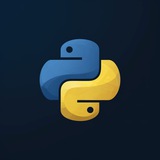Please open Telegram to view this post
VIEW IN TELEGRAM
Please open Telegram to view this post
VIEW IN TELEGRAM
👍38❤9🔥7
Please open Telegram to view this post
VIEW IN TELEGRAM
👍20🔥5👏3
Please open Telegram to view this post
VIEW IN TELEGRAM
Please open Telegram to view this post
VIEW IN TELEGRAM
❤17👍15🔥1
Please open Telegram to view this post
VIEW IN TELEGRAM
❤19👍6
Please open Telegram to view this post
VIEW IN TELEGRAM
👍50🔥7❤1
🔅 Learning SOLID Programming Principles
🌐 Author: Steven Lott
🔰 Level: Intermediate
⏰ Duration: 1h 49m
📗 Topics: Programming, SOLID Design Principles
📤 Join Learn Python for more courses
🌀 Learn the SOLID programming principles to write more stable, scalable code. Get detailed examples and real-world examples of SOLID in action.
Please open Telegram to view this post
VIEW IN TELEGRAM
👍11
Please open Telegram to view this post
VIEW IN TELEGRAM
❤7👍5
Exponential smoothing is useful for capturing the underlying pattern in the data.
The tsmoothie library is a fast and efficient Python tool for performing TimeSeries smoothing operations.
🚀 Link to tsmoothie: https://bit.ly/3L8KXky
The tsmoothie library is a fast and efficient Python tool for performing TimeSeries smoothing operations.
🚀 Link to tsmoothie: https://bit.ly/3L8KXky
❤14👍1
🤯Python interview questions can cover a broad range of topics depending on the specific role and company.
👀👉Here's a list of some common and important Python interview questions:
1. Basics of Python:
- What are the key features of Python?
- Explain the differences between Python 2.x and Python 3.x.
- How is memory managed in Python?
2. Data Types and Data Structures:
- Describe Python's basic data types.
- Explain lists, tuples, sets, and dictionaries in Python.
- What is the difference between shallow copy and deep copy?
3. Control Structures:
- Explain the difference between
- How does a
- What is the use of
4. Functions and Modules:
- Define a function in Python. How do you pass arguments to a function?
- What are lambda functions and how are they used?
- Explain the use of
5. Object-Oriented Programming (OOP):
- What is OOP, and how is it implemented in Python?
- Describe inheritance, encapsulation, and polymorphism.
- What is the purpose of
6. Exception Handling:
- How do you handle exceptions in Python?
- Explain the use of
7. File Handling:
- How do you open and read/write a file in Python?
- What is the difference between
8. Advanced Topics:
- What are decorators in Python?
- Explain generators and iterators.
- Describe the
9. Libraries and Frameworks:
- What are some popular Python libraries used for data analysis?
- Have you worked with any web frameworks in Python (like Django or Flask)?
10. Testing and Debugging:
- How do you perform unit testing in Python?
- What tools are available for debugging Python code?
These questions cover a wide array of Python concepts and are often used to gauge a candidate's familiarity and proficiency with the language.
It's important to not just memorize answers but understand the underlying principles and be able to apply them to real-world problems.
👀👉Here's a list of some common and important Python interview questions:
1. Basics of Python:
- What are the key features of Python?
- Explain the differences between Python 2.x and Python 3.x.
- How is memory managed in Python?
2. Data Types and Data Structures:
- Describe Python's basic data types.
- Explain lists, tuples, sets, and dictionaries in Python.
- What is the difference between shallow copy and deep copy?
3. Control Structures:
- Explain the difference between
if-else and elif statements.- How does a
for loop differ from a while loop?- What is the use of
break and continue statements?4. Functions and Modules:
- Define a function in Python. How do you pass arguments to a function?
- What are lambda functions and how are they used?
- Explain the use of
import and how Python searches for modules.5. Object-Oriented Programming (OOP):
- What is OOP, and how is it implemented in Python?
- Describe inheritance, encapsulation, and polymorphism.
- What is the purpose of
self in Python classes?6. Exception Handling:
- How do you handle exceptions in Python?
- Explain the use of
try, except, finally blocks.7. File Handling:
- How do you open and read/write a file in Python?
- What is the difference between
read() and readline()?8. Advanced Topics:
- What are decorators in Python?
- Explain generators and iterators.
- Describe the
map, filter, and reduce functions.9. Libraries and Frameworks:
- What are some popular Python libraries used for data analysis?
- Have you worked with any web frameworks in Python (like Django or Flask)?
10. Testing and Debugging:
- How do you perform unit testing in Python?
- What tools are available for debugging Python code?
These questions cover a wide array of Python concepts and are often used to gauge a candidate's familiarity and proficiency with the language.
It's important to not just memorize answers but understand the underlying principles and be able to apply them to real-world problems.
👍75❤19🔥11
Please open Telegram to view this post
VIEW IN TELEGRAM
👍41😭28🤔17👎1
